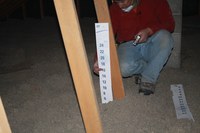Renters Have Energy-saving Options
(Click the image below to view a high-resolution image that can be downloaded)
People renting a home or apartment have some ways to cut their energy bills and increase their comfort.
“The key is to identify the biggest energy users in your situation and work to reduce those,” North Dakota State University Extension Service energy educator Carl Pedersen advises. “Because heating in northern climates is most often the major energy user, concentrate on ways to reduce heating costs first, and then look at other strategies for further savings.”
Here are some of his suggestions for cutting energy usage during the winter:
- Turn down the heat at night and while you are at work. Every degree the thermostat is lowered for an eight-hour period can result in as much as a 1 percent savings on your heating bill, according to the U.S. Department of Energy.
- Check attic insulation levels. The recommended level for attics in most northern climates is a minimum of 16 inches, depending on the insulation type. If you have less than that, ask your landlord to upgrade it.
- Reduce heat to rooms not being used, and keep doors to those rooms closed.
- Use a space heater to heat just one room while keeping the rest of the apartment or home cool.
“Avoid being taken in by outrageous energy saving claims of ‘miracle’ heaters,” Pedersen cautions. “Affordable, high-quality radiant and convection space heaters are available at most hardware or home improvement stores for a fraction of the hundreds of dollars of heavily advertised heaters, and they heat just as well.”
He also says people never should use the kitchen stove for home heating because that poses dangers such as burns, carbon monoxide poisoning and fires.
Here are some other energy-saving methods:
- Check for air leaks around windows and doors. Depending on how leaky the home or apartment is, request that the landlord install a fresh bead of caulk or new weather stripping around window and door frames.
- Install inexpensive heat-shrink film over windows to create a pocket of insulating air and reduce air leaks.
- Open blinds or curtains on the sunny side of the building to allow the sun to heat the room and reduce the need for additional lighting. Close the blinds and curtains at night to retain the heat.
- Turn lights and appliances off when not in use.
- Install energy-efficient light bulbs in frequently used lights.
- Use energy-saving modes on electronic devices. For example, do not use the dry feature on dishwashers. Ensure computers and video games go into sleep modes if you do not turn them off.
- Wash only full loads of clothes. Also consider hanging clothes to dry or partially dry them in the dryer, then hang them to complete drying.
- Wash clothes in cold water with detergents made to work in cold water. Use hot water only for very dirty clothes and diapers.
- Run the dishwasher only when full.
For more tips on reducing energy usage during the winter and summer, view the NDSU Extension Service’s publication “Tips for Saving Energy and Money for Renters.” It’s available online at http://www.ag.ndsu.edu/energy.
NDSU Agriculture Communication
| Source: | Carl Pederson, (701) 231-5833, carl.pedersen@ndsu.edu |
|---|---|
| Editor: | Ellen Crawford, (701) 231-5391, ellen.crawford@ndsu.edu |


